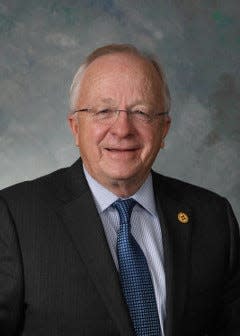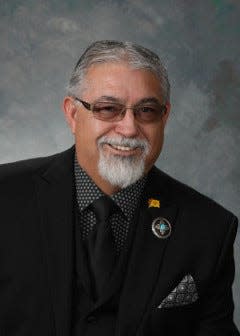Oilfield lawmakers claim success in killing bills aimed at energy pollution in New Mexico
- Oops!Something went wrong.Please try again later.
- Oops!Something went wrong.Please try again later.
Southeast New Mexico’s Republican lawmakers said the 2023 Legislative Session could have been worse as the GOP was able to block several bills aimed at reducing pollution and tightening regulations on oil and gas producers.
The state was working with a $3.5 billion budget surplus this year, a surge largely attributed to booming oil and gas production in the Permian Basin region, and Republicans chided Democrat-led initiatives they said either spent too much to threatened to stymie the state’s leading revenue source.
A series of environmentally focused bills during the session that ended Saturday were either voted down in committee or stalled during the session and didn’t receive the needed votes to go to the desk of Gov. Michelle Lujan Grisham to become law.
More:Pollution bills struggle in New Mexico legislature. Here's what passed and failed
Among these, the Clean Future Act would have set benchmarks each decade to cut greenhouse gas emissions statewide and require New Mexico become “net-zero” by 2050 – meaning the state would remove more carbon from the air than it puts out.
The act was blocked by a deadlocked vote in its first committee.
And Senate Bill 418 would have increased oversight of the oil and gas industry and removed a cap on bonding operators pay to the State to fund remediation of wells should they be abandoned.
More:Will a nuclear waste project move forward despite New Mexico's bill aiming to block it?
SB 418 passed the Senate Conservation Committee, but never got a hearing before the subsequent Senate Judiciary Committee.

“It was not as bad as it could have been,” said Sen. Gay Kernan (R-42) of Hobbs. “There were some things that got to the governor’s desk that were concerning, but others that didn’t make it were worse.”
Kernan also argued the budget passed by lawmakers, led by Democrats who own a majority in both the House and Senate along with the governor’s office, was “too big” at almost $9.6 billion – marking a 14 percent increase from last year when it was grown by 12 percent from the year prior.
More:Renewable energy now required on New Mexico state land after Lujan Grisham signs bill
But she said this growth was only allowed by New Mexico’s oil and gas industry expanding as fuel demand skyrockets amid the world’s recovery from COVID-19 and the removal of Russia from international markets.
That meant more pressure on American fossil fuel producers, and the U.S.’ busiest oil and gas region in the Permian Basin of New Mexico and West Texas.
“I do think people are recognizing that when oil and gas is strong, it helps the state achieve things that are needed,” Kernan said. “I think it’s just knowing that without the oil and gas revenue, we can’t easily replace that revenue with other industries.”
More:Here's what to know about New Mexico's wildfire bills considered by lawmakers this year
Two Republican-supported measures did pass the legislature to make $25 million appropriations each to Carlsbad and Hobbs, a measure to replace municipal revenue lost from gross receipts tax paid where a business' operations take place rather than the city where it is located.
This problem arose for oilfield cities like Carlsbad and Hobbs that host several oil companies who drill for oil outside city limits.
Those bills were awaiting Lujan Grisham’s signature into law, and Kernan was hesitant to assume they would both be signed.
More:Oil and gas air pollution, climate change targeted by New Mexico Senate bill
“We’ll just find out if she’ll support both or just one,” Kernan said. “But we need to work on a permanent solution. We proposed a good one, but it just needs more time.”
That permanent fix took the form of another bill sponsored by Rep. Larry Scott (R-62) also of Hobbs and would base 70 percent of GRT distribution on a city or county’s population, and 30 percent on the amount the local jurisdiction sends to the state.
The smaller portion was intended to favor rural communities in the Permian that generate large portions of the state’s revenue.
More:New Mexico bill seeks millions of dollars in fossil fuel tax credits for gas capture
Rep. Jim Townsend (R-54) of Artesia said the GOP’s defensive success this year came from telling the story of oil and gas, and the southeast region’s outsized role in New Mexico’s growing revenue.

“Our budget is going up year over year. Funding for education is going up,” Townsend said. “I think many legislators are realizing that if it weren’t for a robust oil and gas economy, they wouldn’t be in that shape.”
Townsend lamented several Democrat initiatives to prop up renewable energy, or expand the state’s use of electric cars, arguing such technologies were “unaffordable” for lower-income, rural residents who must often drive hours for services like healthcare.
More:Democrats block GOP-backed crime bills targeting fentanyl, trafficking in New Mexico
He said tax incentives sought by lawmakers to support renewables were short-sighted and did nothing to support the economy in the long-term.
“You would think the legislature would be doing things to get them good jobs and opportunities, not just another handout,” he said of rural communities. “It’s just a Band-Aid. We should be preparing the economy and industry to grow and thrive.
“The only reason to invest in big-scale renewables is the tax incentives.”
More:Electric police cars? Bill would require 75% of state-owned vehicles be battery powered
Other measures like the Clean Future Act, Townsend said, would serve only to raise energy prices for New Mexicans. He said the fossil industry was already proving successful at reducing its own environmental impacts.
“What we ought to be doing is figuring out how to use the most efficient technology to better people’s lives,” Townsend said. “We should do that by economic, American ingenuity. You don’t do it by stifling.”
But that’s exactly what several lawmakers across the aisle tried to do during the session by tightening regulations, said Sen. David Gallegos (R-41) of Eunice.

“If you take oil and gas out, we hurt our kids, teachers and schools,” he said. “I think we put out enough message. They realized how much value oil and gas does and how much money we get.”
Despite the contributions of rural New Mexico, Gallegos said the divide only worsened this year between his region and the largely Democrat-led urban areas like Albuquerque and Las Cruces.
“They do exactly what they want to do regardless of the rest of New Mexico,” he said. “They’re able to dictate to the rest of the state. We need to have a voice for rural New Mexico.”
Adrian Hedden can be reached at 575-628-5516, achedden@currentargus.com or @AdrianHedden on Twitter.
This article originally appeared on Carlsbad Current-Argus: Southeast New Mexico lawmakers fight against oil and gas reforms
